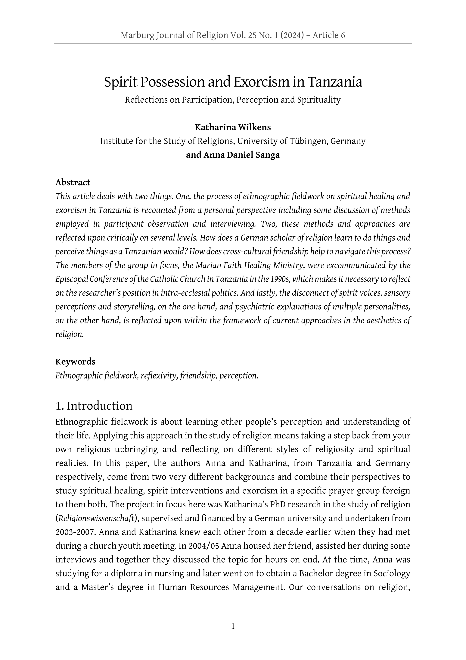Spirit Possession and Exorcism in Tanzania Reflections on Participation, Perception and Spirituality
This article deals with two things. One, the process of ethnographic fieldwork on spiritual healing and exorcism in Tanzania is recounted from a personal perspective including some discussion of methods employed in participant observation and interviewing. Two, these methods and approaches are refle...
I tiakina i:
| I whakaputaina i: | Marburg Journal of Religion |
|---|---|
| Ngā kaituhi matua: | , |
| Hōputu: | Artikel (Zeitschrift) |
| Reo: | Ingarihi |
| I whakaputaina: |
Philipps-Universität Marburg
2024
|
| Ngā marau: | |
| Urunga tuihono: | Urunga tuihono |
| Ngā Tūtohu: |
Kāore He Tūtohu, Me noho koe te mea tuatahi ki te tūtohu i tēnei pūkete!
|
| Whakarāpopototanga: | This article deals with two things. One, the process of ethnographic fieldwork on spiritual healing and exorcism in Tanzania is recounted from a personal perspective including some discussion of methods employed in participant observation and interviewing. Two, these methods and approaches are reflected upon critically on several levels. How does a German scholar of religion learn to do things and perceive things as a Tanzanian would? How does cross-cultural friendship help to navigate this process? The members of the group in focus, the Marian Faith Healing Ministry, were excommunicated by the Episcopal Conference of the Catholic Church in Tanzania in the 1990s, which makes it necessary to reflect on the researcher’s position in intra-ecclesial politics. And lastly, the disconnect of spirit voices, sensory perceptions and storytelling, on the one hand, and psychiatric explanations of multiple personalities, on the other hand, is reflected upon within the framework of current approaches in the aesthetics of religion. |
|---|---|
| DOI: | 10.17192/mjr.2024.25.8696 |
